Who Decides What is Too Far – Syria Attacks Rebels with Poison Gas : A Well Thought Out Scream by James Riordan
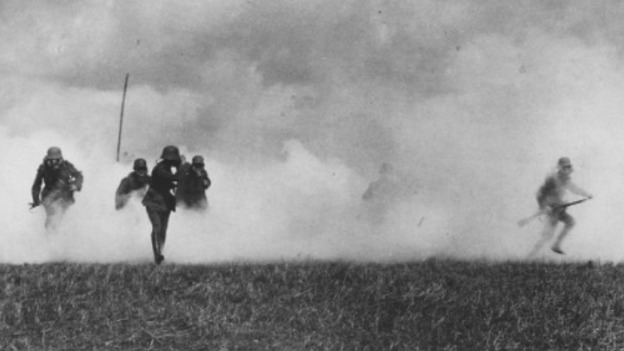
Where is the line that we all agree not to cross? What is the limit of evil, the amount of death, the level of human pain that we agree not to exceed in the name of humanity. The answer, unfortunately, when it comes to political power and rule is that there is no limit. This past week the Syrian government attached rebels in the eastern suburbs of Damascus with poison gas. At least forty people were killed and that includes many women and several children. Emergency responders and relief organizations claimed they discovered families suffocated in their homes and shelters in the town of Douma, with foam on their mouths. They were not able to identify the substance used, but the Syrian American Medical Society and Syrian Civil Defense said the survivors treated at clinics smelled strongly of chlorine.
The news began surfacing late Saturday, but could not be verified. The government denied that it had used chemical weapon in its assault SANA. the state news agency. said the rebels, calling themselves the Army of Islam agreed to leave Douma on Sunday, after three days of intensive government shelling and bombardment. The news agency added that buses had been sent to the town to pick up prisoners released by the militants and to transport rebel fighters to opposition-held territory in north Syria. Douma was the last rebel stronghold in Damascus.
This image made from video released by the Syrian Civil Defense White Helmets, which has been authenticated based on its contents and other AP reporting, shows a toddler given oxygen through respirators following an alleged poison gas attack in the opposition-held town of Douma, in eastern Ghouta, near Damascus, Syria, Sunday, April 8, 2018. The Civil Defense said patients were having difficulty breathing and burning in their eyes. Syrian opposition activists and rescuers said Sunday that a poison gas attack on a rebel-held town near the capital. The Syrian government denied the allegations, which could not be independently verified.After
The Syrian Civil Defense first responder group documented 42 fatalities but was impeded from searching further by strong odors that gave their rescuers difficulties breathing, said Siraj Mahmoud, a spokesman for the group, which is known as the White Helmets. Douma has been devastated by close to five years of siege at the hands of government forces. It was once one of the hubs of the 2011 Arab Spring-styled uprising against President Bashar Assad’s government.
There had been an ongoing negotiation between the government and the rebels concerning surrendering Douma, but these talks collapsed on Friday resulting in the government resuming efforts to retake the town after a ten day peace. The Syrian Observatory for Human Rights said at least eighty people were killed in Douma on Saturday, including forty who died from suffocation. But it said the suffocations were the result of shelters collapsing on people inside them. “Until this minute, no one has been able to find out the kind of agent that was used,” said Mahmoud, the White Helmets’ spokesman, in a video statement from Syria. He said the government was also targeting homes, clinics, and first responder facilities with conventional explosives and barrel bombs. Most of the medical points and ambulances of the town have been put out of service.
In recent weeks, government forces have recaptured villages and towns in the eastern Ghouta suburbs of the capital. Douma was the only town left holding out. A joint statement by the Civil Defense and the Syrian American Medical Society, a relief organization, said that more than 500 people, mostly women and children, were brought to medical centers with difficulty breathing, foaming at the mouth, and burning sensations in the eyes. It said patients gave off a chlorine-like smell. Some had bluish skin, a sign of oxygen deprivation. It said the symptoms were consistent with chemical exposure. One patient, a woman, had convulsions and pinpoint pupils, suggesting exposure to a nerve agent.
This photo released by the Syrian Civil Defense White Helmets, which has been authenticated based on its contents and other AP reporting, shows smoke rising after Syrian government airstrikes hit in the town of Douma, in eastern Ghouta region east of Damascus, Syria, Saturday, April. 7, 2018. Syrian government forces pressed their offensive against the last rebel-held town in eastern Ghouta near the capital Damascus on Saturday under the cover of airstrikes as shelling of civilian areas on both sides claimed more lives, state media and opposition activists said.
The Syrian government, in a statement posted on the state-run news agency SANA, strongly denied the allegations. It said the claims were “fabrications” by the Army of Islam, calling it a “failed attempt” to impede government advances.
“The army, which is advancing rapidly and with determination, does not need to use any kind of chemical agents,” the statement said.
The Army of Islam was negotiating with Russia, an ally of Damascus, to withdraw its fighters and allow government institutions back into the town, according to the Observatory. An agreement was said to have Russia deploy its military police to take guardianship of the town as Army of Islam fighters handed over their heavy weapons, the group added, but when those discussions ended on Friday, the government began shelling and bombing Douma indiscriminately. Hundreds of fighters and their relatives had already left Douma for rebel-held areas in northern Syria.
Smoke billows in the town of Douma, the last opposition holdout in Syria’s eastern Gouda, on April 7, 2018, after Syrian troops resumed a military blitz to pressure rebels to withdraw.
U.S. State Department spokeswoman Heather Nauert said that Washington was closely following “disturbing reports” of the alleged chemical weapons attack in Douma. “These reports, if confirmed, are horrifying and demand an immediate response by the international community,” she said in a statement late Saturday. The Syrian government and its ally, Russia, denied any involvement in the alleged gas attack
Videos posted online by the White Helmets showed victims, including toddlers in diapers, breathing through oxygen masks at makeshift hospitals. The alleged gas attack in Douma comes almost exactly a year after a chemical attack in the northern Syrian town of Khan Sheikhoun killed dozens of people. That attack prompted the U.S. to launch several dozen Tomahawk cruise missiles at a Syrian air base. President Donald Trump said the attack was meant to deter further Syrian use of illegal weapons.
Buses carrying families of Jaish al-Islam fighters from the former rebel bastion’s main town of Douma arrive near the northern Syrian town of al-Bab, on April 5, 2018.
Maj. Gen. Yuri Yevtushenko was quoted by Russian news agencies on Sunday as saying Russia was prepared to send specialists to Douma to “confirm the fabricated nature” of the reports. A chemical attack in eastern Ghouta in 2013 that was widely blamed on government forces killed hundreds of people, prompting the U.S. to threaten military action before later backing down. Syria denies ever using chemical weapons during the seven-year civil war, and says it eliminated its chemical arsenal under a 2013 agreement brokered by the U.S. and Russia after the attack in eastern Ghouta.
When innocent children are gassed and suffer horrible deaths, many Americans feel the United States should take action and stop the atrocities. On the other hand when we try to police the world we get into mini-wars that can drag on for years like the one in Afghanistan. The simple truth is you can’t have both ways — either we conquer everything in our path and conform it to what we believe is right or we tactfully agree to look the other way while horror upon horror is visited upon our fellow man. There is no easy decision. Once again we refer to the old bluesman wisdom — “You pays yous money and you takes yous choice.”


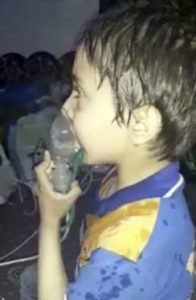
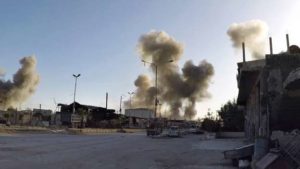
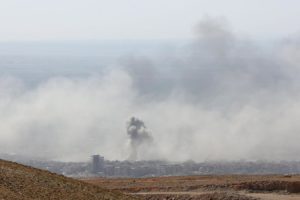
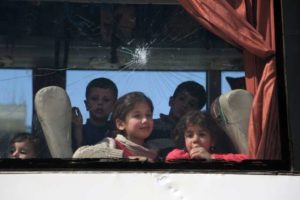
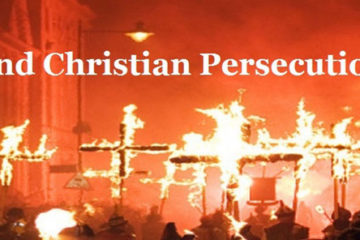
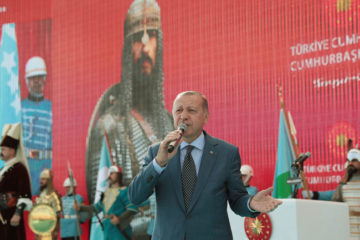
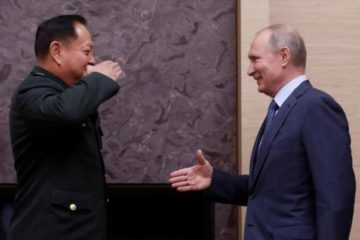
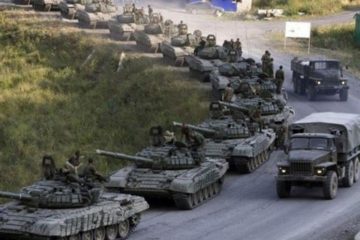

No Comment